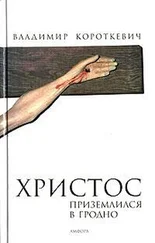At the very windows a small cast-iron pot stood on two bricks, and an old hunchbacked woman was stirring something in it with a spoon. The stoves in the wind probably smoked and therefore the food was prepared in the open air until the late autumn.
And again the green but dismal alleyway of trees. I walked until I came to the place where we had entered the park the night before. The marks that our carriage had made were still visible, and the forged-iron fence, a surprisingly fine piece of work, had fallen down long ago, and broken into pieces it lay there thrown aside. Birch trees had grown through its curves. And behind the fence, (here the alleyway turned to the left and dragged on leading to nobody knew where), lay a brown endless plain with twisted trees here and there, enormous stone boulders, and the green windows of the quagmire, (into one of which we had, evidently, almost fallen yesterday), and I grew cold with terror.
A lonely crow was circling above this distressing place.
When I returned home from the farmstead towards evening, I was so exhausted I could hardly pull myself together. I began to think that this would last forever: these brown plains, the quagmire, the people more dead than alive from feverish mania, the park, dying of old age — all this hopeless land was nevertheless my own, my native land, covered in the day by clouds, and in the night by a wild moonlight, or else by an endless rain pouring down over it.
Nadzieja Janoŭskaja awaited me in the same room and again that strange expression on her distorted face, that same indifference to her clothes. There were some changes only on the table where a late dinner was served.
The dinner was a most modest one and did not cost the mistress a kopeck, for all this food was prepared from local products. In the middle of the table there stood a bottle of wine and it, too, was apparently from their own cellars. And the rest was a firework of flowers and forms. In the middle stood a flower vase and, in it, two small yellow maple branches, and beside it, though probably from another set, a large silver soup-bowl, a silver salt-cellar, plates, several dishes. However, it was not the lay-out of the table that surprised me or even that the dishes were all from different sets, darkened with age, and here and there, somewhat damaged. What surprised me was the fact that they were of ancient local workmanship.
You no doubt know that two or three centuries ago, the silver and gold dishes in Belarus were mainly of German make and were imported from Prussia, These articles, richly decorated with “twists and turns”, with figures of holy men and angels, were so sugary sweet that it was nauseating, but nothing could be done about it, it was the fashion.
But this was our own: the clumsy stocky little figures on the vase, a characteristic ornament. And the women depicted on the salt-cellar had even the somewhat wide face of the local women.
And also, there stood two wine glasses of iridescent ancient glass which today cannot be bought even for gold (the edge of one wineglass, the one standing at my hostess's place, was somewhat chipped).
The last and the only sun-ray that day shone in through the window, lighting up in it dozens of varicoloured little lights.
The mistress had probably noticed my look and said:
“This is the last of three sets which were left by our forefather, Raman Žyś-Janoŭski. But there is a stupid tradition that it had probably been presented to him by — King Stach.”
Today she was somehow livelier, did not even seem to be so bad-looking, she evidently liked her new role.
We drank wine and finished eating, talking almost all the time. It was a red wine, red as pomegranate, and very good. I became quite cheerful, made the mistress laugh, and on her cheeks there appeared two pink spots, not very healthy ones.
“But why did you add to the name of your ancestor this nickname ‘Žyś’?”
“It's an old story,” she answered, becoming gloomy again. “It seems it happened during a hunt. An aurochs charged the somewhat deaf king behind his back and the only one who saw it was Raman. He shouted: ‘Žyś’! This in our local dialect means ‘Beware’. And the King turned about, but running aside, fell. Then Raman at the risk of killing the King, shot, the bullet struck the aurochs in the eye, and the aurochs fell down almost beside the King. After that a harquebus was added to our coat-of-arms and the nickname ‘Žyś’ to our surname.”
“Such incidents could have occurred in those days,” I confirmed. “Forgive me, but I know nothing that concerns heraldry. The Janoŭskis, it seems to me, go back to the 12th century?”
“To the 13th,” she said. “And better if they didn't. These laws concerning one's origin are pure foolishness, but you cannot fight them: these fireplaces, this necessity for one of the heirs to live in this house, the ban on selling it. Whereas we are beggars. And this house, this awful house... It is as if some curse has been put upon us. We were twice deprived of our family coat-of-arms, were persecuted. Almost none of our ancestors died a natural death. This one here in the red cloak was still alive when the church performed the funeral service over his body. This woman here with an unpleasant face, a distant relative of ours, Dastajeŭskaja, (by the way, a distant ancestor of the writer Dostoyevsky), killed her husband and almost did the same with her step-son. She was condemned to death. It cannot be helped, all this must be paid for by descendants, and with me the Janoŭski family ends. But sometimes I ache so to lie in the warm sun, in the shade of real trees, trees that do not grow here. At times I dream of them — young, very large, airy as a green cloud. And spas, such bright, such full spas that take your breath away, that make your heart stop with happiness. But here this ugly, loathsome quagmire and gloom, these firs...”
The flames in the fireplace had brought a slight flush to her face. Behind the windows the dark night had come into its own and it seemed a heavy shower had begun.
“Oh Mr. Biełarecki! I am so happy that you are here, that a person is sitting beside me. Usually I sing aloud on such evenings, though I don't really know any good songs, all are old ones from the manuscripts gathered by my grandfather. And they are full of horrors: a man leaves a bloody track on the dewey grass, a bell that was long ago drowned in the quagmire rings at night, just rings and rings on and on...”
The days come and the days go,
she began to sing, her voice deep and trembling.
The days come and the days go,
A shadow looms over the land.
Skazko and Kirdziaj, the Rat,
Raging, fight day and night.
Blood everywhere flows,
Flames spread, steel rings.
Falls our Skazko and calls:
“Where are you, my friends?”
Unheard are his cries.
But Lubka Jurjeŭna hears.
Gathers her brethren.
Mighty and brave
Far and wide
They stormily rude
To the distant red marshes.
“The rest is bad, I don't wish to sing it. Only the last lines are good:”
And they loved each other
And in concord they lived
While over the land
Sunshine did reign
Till into the earth
Together were laid.
I was deeply touched, to the very depths of my soul. Such a feeling can arise in a person only when he deeply believes what he is singing about. And what a wonderful song of olden times!
But she suddenly buried her face in her hands and began to sob. Upon my word of honour, my heart bled. I couldn't help it. I have an inexcusable and deep compassion for people.
I don't remember the words I found to comfort her. I must say, dear reader, that up to this point in my story, I have been a severe realist. You must know that I do not very much like novels in the spirit of Madam Radcliffe, and would be the first to disbelieve, were anybody to tell me the things that took place later on. And therefore the tone of my story is going to change sharply.
Читать дальше



